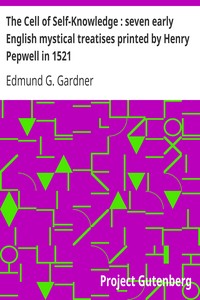| Compiler |
Pepwell, Henry, -1540? |
| Editor |
Gardner, Edmund G., 1869-1935 |
| Title |
The Cell of Self-Knowledge : seven early English mystical treatises printed by Henry Pepwell in 1521
|
| Note |
Reading ease score: 66.0 (8th & 9th grade). Neither easy nor difficult to read.
|
| Contents |
I. A very devout treatise, named Benjamin, of the mights and virtues of a man's soul, and of the way to true contemplation, comp. by ... Richard of Saint Victor -- II. Divers doctrines devout and fruitful, taken out of the life of that glorious virgin and spouse of Our Lord, Saint Katherin of Seenes -- III. A short treatise of contemplation taught by Our Lord Jesus Christ, or taken out of the book of Margery Kempe, ancress of Lynn -- IV. A devout treatise, comp. by Master Walter Hylton, of the song of angels -- V. A devout treatise called the Epistle of prayer -- VI. A very necessary epistle of discretion in stirrings of the soul -- VII. A devout treatise of discerning of spirits, very necessary for ghostly livers.
|
| Credits |
Produced by Charles Aldarondo, with thanks to the CCEL
(www.ccel.org) collection. HTML version by Al Haines.
|
| Summary |
"The Cell of Self-Knowledge: Seven Early English Mystical Treatises" is a collection of mystical writings edited by Edmund G. Gardner, published in the early 20th century. This work aims to explore the profound themes of self-knowledge, contemplation, and divine love through the lens of various early English mystical authors, including Richard of St. Victor and Margery Kempe. It is likely reflective of the spiritual concerns of the medieval period, focusing on the journey of the soul towards understanding and unity with God. The opening of the collection introduces Richard of Saint Victor's treatise, which discusses the intricacies of the soul's faculties—reason and affection—by using an allegorical framework based on the biblical figure Jacob and his family. Each of Jacob's sons represents a different virtue or vice related to the spiritual journey. Richard emphasizes that true self-knowledge is key to spiritual elevation and that one's understanding of God and themselves is interlinked. The text's rich, symbolic imagery lays the foundation for an exploration of personal spirituality and divine contemplation, encouraging readers to reflect on their inner lives and the virtues they cultivate within their souls. (This is an automatically generated summary.)
|
| Language |
English |
| LoC Class |
BV: Philosophy, Psychology, Religion: Christianity: Practical theology, Worship
|
| Subject |
Devotional literature
|
| Subject |
Mysticism -- Great Britain
|
| Subject |
Mysticism -- History -- Middle Ages, 600-1500
|
| Subject |
Religious thought -- Middle Ages, 600-1500
|
| Category |
Text |
| EBook-No. |
4544 |
| Release Date |
Oct 1, 2003 |
| Most Recently Updated |
Dec 28, 2020 |
| Copyright Status |
Public domain in the USA. |
| Downloads |
105 downloads in the last 30 days. |
|
Project Gutenberg eBooks are always free!
|

